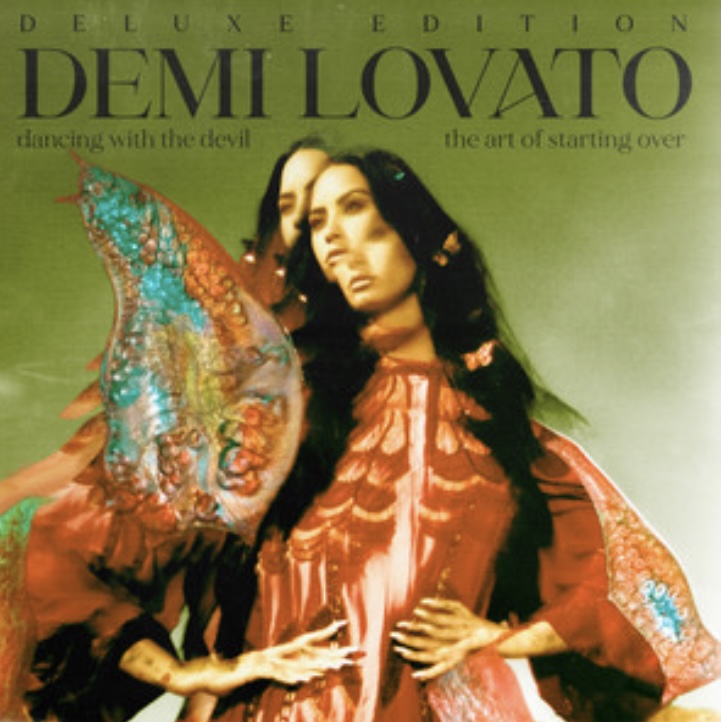Liner Notes: Demi Lovato’s living her truth in “Dancing With The Devil…The Art of Starting Over”
Demi Lovato’s living her truth in “Dancing With The Devil...The Art of Starting Over”
April 29, 2021
The Monthly
Content warning: This story mentions drug and alcohol addiction.
Demi Lovato’s seventh studio album, “Dancing With The Devil…The Art of Starting Over,” centers around her nearly fatal drug overdose in 2018 and her path to recovery. The 19 song collection tells a larger story of addiction, one that candidly captures the stumbles and triumphs of a difficult recovery.
Lovato has been a longtime advocate for mental health awareness and substance abuse but she is less reserved and more honest than ever before, both in her album and YouTube docuseries, “Demi Lovato: Dancing with the Devil,” which accompanied the album’s release.
The lyrics themselves hold paramount significance in the album. Lovato chronicles her journey through prose carefully chosen to reflect her experiences. The specificity makes the songs accessible, and invites listeners to momentarily step into her story, sparing them the need to constantly read between the lines.
Lovato wrote the album opener, “Anyone,” just days before her overdose. In a desperate plea for help, Lovato sings, “Anyone, please send me anyone/Lord, is there anyone?” She describes how she felt alone, and how this made her turn to alcohol — “I tried to talk to my piano/I tried to talk to my guitar/Talked to my imagination/Confided into alcohol.” The simplicity of the piano instrumental pairs perfectly with Lovato’s powerful voice, allowing the song to focus on her dealing with her grief alone.
The theme of vulnerability continues in the title song and second track “Dancing with the Devil.” Lovato shares her initial thought process, “It’s just a little red wine, I’ll be fine,” which advances in the second verse, “But soon, that little white line is a little glass pipe/Tinfoil remedy, almost got the best of me.” Each seemingly harmless encounter led to another until she was tumbling toward addiction.
The next track, “ICU (Madison’s Lullabye),” is a heartfelt tribute dedicated to Lovato’s younger sister, who she wasn’t able to see when she woke up in the hospital with brain damage that left her legally blind. “I promise I’ll be there, don’t worry/’Cause I was blind, but now I see clearly” reflects Lovato’s dedication to being present for her sister, who felt the impact of her near-fatal overdose.
The songs about her recovery are where listeners can most hear the reflection and hints of optimism to foreshadow what is to come. In “The Art of Starting Over,” Lovato sings about having started over so many times she has mastered the process. “Give me a pen, I’m rewriting another ending/It didn’t turn out the way that I wanted.” She prepares a new trajectory for her story, one that involves finding restoration and clarity.
Alongside tracks directly addressing Lovato’s experience with substance abuse, the album also includes duets featuring Ariana Grande in “Met Him Last Night,” a throwback to their Nickelodeon and Disney days, and “What Other People Say,” featuring Australian singer Sam Fischer, about quite literally not caring about what other people say.
Lovato embraces all parts of her identity in the album, including her fluid sexuality in “The Kind of Lover I Am.” In the song she addresses her future partner saying, “Doesn’t matter, you’re a woman or a man/That’s the kind of lover I am . . . I’ll hold you, console you, really get to know you.” She revealed in the album’s docuseries that she cut her hair short to break the gender norms placed on her since she was a child. This song brought another layer of Lovato’s identity to the forefront of her story.
In “California Sober,” Lovato shares her experience finding a healing process unique to herself, one that involves her drinking in moderation. She sings, “It doesn’t have to mean the growin’ part is over/No, it ain’t black or white, it’s all of the colors,” emphasizing her story is still changing, and her experience is bound to look different than that of others.
The sheer vulnerability of Lovato’s latest album reveals her journey is far from over, and she will continue to rise out of the most unlikely circumstances.
Email: [email protected]
Related Stories:
— Liner Notes: Jazmine Sullivan’s “Heaux Tales” is 2021’s first great album
— Liner Notes: Former “Degrassi” star shines on new EP

